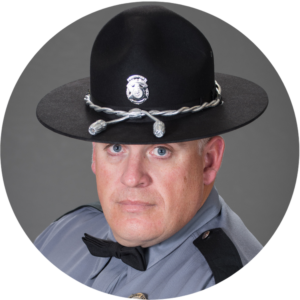
Roadway To Your Future
Commercial Vehicle Enforcement Officers are trained and certified commercial motor vehicle subject matter experts that strive to make Washington roadways the safest in the nation. CVEOs are responsible for promoting the safe travel of commercial vehicles on state highways through education and enforcement, along with enhancing safe transportation of school children and protecting the state’s infrastructure.
CVEOs enforce laws and regulations pertaining to weight, size, and equipment safety, the transportation of hazardous materials, driver/vehicle licensing and permit requirements by performing Commercial Vehicle Safety Alliance (CVSA) driver/vehicle inspections on commercial motor vehicles. CVEOs also have pivotal roles in assisting with investigations of major accidents and fatalities involving commercial vehicles, assisting the Fuel Tax Evasion Task Force, assisting the Drug Interdiction Assistance Program (DIAP), identifying stolen heavy equipment, and Truckers Against Trafficking Programs.
Have questions or need assistance? Chat with a recruiter or contact our Talent Acquisition Specialists by phone or at jobs@wsp.wa.gov.
Chat with a Recruiter:
Chat with a Talent Acquisition Specialist:

Specialties
Compliance Review Section, (CR) officers identify and intervene with motor carriers whose operations pose the greatest risk to public safety. These in-depth investigations evaluate why safety problems occur and encourage corrective action to improve safety by maintaining safe vehicles, hiring the safest possible drivers and preventing commercial motor vehicle (CMV) crashes, injuries, and fatalities.
New Entrant Section, (NE) officers provide educational and technical assistance to motor carriers’ during their first 18 months on the road, those carriers are considered “new entrants”. NE officers conduct Safety Audits which are designed to verify that a carrier has basic safety management controls in place to ensure compliance with applicable regulations and related record-keeping requirements.
School Bus Inspection Program: Over 455,000 students are transported each day in Washington State with 100 million miles driven annually. School buses are the most regulated vehicle on the road and the officers involved in this program are tireless in their efforts by conducting inspections on 100% of the school buses in Washington State every year during the summer and 25% of school buses during the winter..
Once you have started your career as a CVEO numerous opportunities exist to enhance upon your career path
- General Hazmat Certification
- Passenger Carrier Vehicle Inspection Certification
- Radiological Hazmat Load Inspection Certification
- Training Academy Instructor
- CTW Instructor
- Cargo Tank Inspection Certification
- Bulk Hazmat Inspection Certification
- Field Training Officer
- Safety Seminar Facilitator
Benefits
CVEO 1
$5,050 – $6,794 per month
$60,600 – $81,528 a year
CVEO 2 (Lead Worker)
$5,574 – $7,493 per month
$66,888 – $89,916 a year
CVEO 3 (Supervisor)
$6,463 – $8,688 per month
$77,556 – $104,256 a year
CVEO 4 (Program Manager)
$7,493 – $10,075 per month
$89,916 – $120,900 a year

Continuing Education
We will pay for you to continue pursuing your degree

Health Insurance
WSP offers more health care
options than almost any other
employer in the state.

Retirement Plan
CVEOs can choose between
the Public Safety Employees Retirement
System Plan 2 or 3.

Loan Forgiveness
WSP Employees may also be qualified for the U.S. Department of Education’s Public Service Loan Forgiveness program for student loans.
Requirements
- Be a United States Citizen or a Lawful Permanent Resident of the United States of America
- Be 21 years old at time of application
- Possess a current, non-probationary, and non-restricted valid driver’s license
- Possess a valid non-probationary Washington driver’s license prior to employment with WSP
- Possess a high school diploma from a state sanctioned and recognized school or GED equivalent
Process
Step 1 – Apply
Complete the following: Create an online account on the State of Washington’s job site and apply when a position becomes available.
You are allowed to take the test twice in a 12 month period with at least 30 days between tests.
Step 2 – Pass the Three Phase Hiring Process
Phase 1 – Written Exam and Oral Board Interview, testing is offered in several WA locations
Phase 2 – Polygraph and Background Check
Phase 3 – Psychological and Medical Exam
Step 3 – Begin the Three Phase Training Program
Phase 1- Pre- Academy training will consist of on-the-job training at eventual work sites. During this training the recruit will develop a basic understanding of the process of inspecting CMVs.
Phase 2- Consists of attendance at the WSP Training Academy for CVEO Basic Training. This fourteen week training program is designed to prepare the recruit on those job skills necessary to perform the duties of a CVEO 1. This includes first aid, firearms training, defensive tactics, as well as training in conducting CVSA inspections.
Phase 3- Consists of 10 weeks with a Field Training Officer conducting supervised inspections at the assigned work site. Upon successful completion of the F.T.O. period the officer will be certified in performing CVSA Inspections and be sworn in as a Commissioned CVEO 1 with the WSP!
Contact a CVEO

CVEO 2 Amanda Collins
Western Washington
(425) 240-0813 (Cell)

CVEO 2 Jesse Leland
Western Washington
(360) 485-5143 (Cell)

CVEO 2 Mireya Antunez-Quebrado
Eastern Washington
(509) 578-9447 (Cell)

CVEO 2 Lace Koler
Eastern Washington
(509) 904-5593 (Cell)
